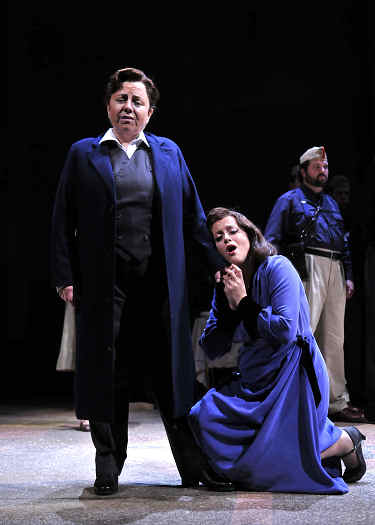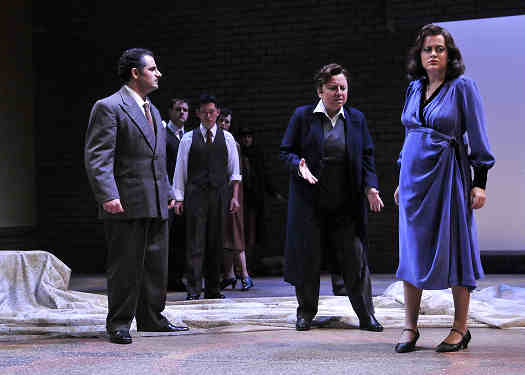Other Links
Editorial Board
-
Editor - Bill Kenny
Founder - Len Mullenger
Google Site Search
SEEN
AND HEARD INTERNATIONAL OPERA
REVIEW
Rossini, Tancredi:
Soloists, orchestra and chorus of Opera Boston, Gil Rose (Conductor),
Boston, Massachusetts, 23.10.2009 (LS)
Conductor: Gil Rose:
Stage Director: Kristine McIntyre
Producer: Carole Charnow
Scenic and Costume Design: Carol Bailey
Lighting Designer: Christopher Ostrom
Assistant Conductor: Edward Elwyn Jones
Répétiteur: Linda Osborn-Blashke
Resident Coach and Surtitles: Allison Voth
Cast:
Tancredi: Ewa Podles
Argirio: Yeghishe Manucharyan
Amenaide: Amanda Forsythe
Orbazzano: DongWon Kim
Isaura: Victoria Avertisyan
Roggerio: Glorvy Arroyo
Stage Director Kristine McIntyre chose to
propel the Tancredi tale into what appears to be Spain in the mid
1930s. Instead of rival families, the first scene shows a group of
businessmen led by Argirio seeking peace with a gang of military
officers led by Orbazzano. Swords are replaced by pistols. Yet,
Solimar and the Saracens remain as the common enemy. The set is
gloomy minimalist. Frankly I did not find this modernized version
convincing, although fortunately it did not detract from the singing
and acting. 
Ewa Podles (Tancredi)
and Amanda Forsythe (Amenaide)
Tancredi, the tenth of Rossini’s
operas, was his first big hit. It premiered in Venice on February 6,
1813, but wasn’t heard in its complete form till February 12,
because both Amenaide and Tancredi fell ill during its first
performance. Its second staging was in Ferrara where it acquired a
new and unhappy ending consistent with Voltaire’s tragedy on
which Rossini’s Tancredi was based. For the rest of the
19th century the happy ending returned.
Most of
Tancredi was new music. But Rossini wasn’t averse to
some borrowing. Indeed the overture came from Pietra di Paragone
and one chorus plus some fascinating musical phrases were taken from
the ill fated Ciro in Bibilonia. Perhaps the most famous aria
in Tancredi – Di Tanti palpiti—is eerily similar
to Eco pietosa in Pietra di Paragone.
The plot is
relatively simple. The year is 1005 AD and the place is Syracuse,
Sicily. Argirio wants his daughter Amenaide to marry Orbazzano in
order to unite their families against their common enemy—Solimar
and the Saracens. But Amenaide loves Tancredi - a
trouser role played by a mezzo or contralto. She sends him a letter
begging for his return to save Syracuse and to be reunited with
her. Unfortunately she doesn’t address the letter or even
mention Tancredi’s name. When Orbazzano is rebuffed he produces
the letter and says it had been sent to Solimar. Amenaide is charged
with treason and sentenced to die. Her father, after much agony,
signs the death certificate. An unknown warrior –Tancredi of
course – challenges Orbazzano to a duel on Amenaide's
behalf and prevails. In most bel canto potboilers this would
be the end of the opera, and the ecstatic heroine would bring down
the curtain with a rondo finale. But Tancredi is part Hamlet. He is
forever crying out “Where am I” and “Why is my life
so terrible”. He refuses to believe that Amenaide is faithful
to him, and rushes off to do battle with Solimar - prepared to die.
In the original version, Tancredie kills
Solimar and returns to Amenaide. The truth about the letter is
revealed and all ends happily. In the
Ferrara ending –utilized by Opera Boston— Tancredi is
mortally wounded though the Saracens are defeated. The
extraordinarily poignant death scene with Tancredi’s
forgiveness of Amenaide is matched nowhere else in Rossini’s
operas.

Yeghishe Manucharyan (Argirio) Podles and Forsythe
Bel canto means beautiful singing of
course, and Opera Boston’s Tancredi included some
of the most wonderful singing Boston has experienced in many years.
Heading the cast was the world famous Ewa Podles
whose operatic career began in 1955 at the
age of 3 when she she played the son of Pinkerton and Cio-Cio San in
Puccini’s Madama
Butterfly. Her repertoire is vast – from Wagner to Handel.
Tancredi has always been one of her favorite roles however
In a recent article by Harlow Robinson in the Boston Globe she is
quoted saying, “The role of
Tancredi is vocally rather smple. It doesn’t have all the
elaborate ornamentation and cadenzas of the coloratura, of the role
of Amenaide. I always say that the opera should really be called
Amenaide. But it is the character of Tancredi who brings tears to the
eyes of the audience. In this role I can convey a message through
words and expression. I can use the masculine color of my voice to
its full effect. These days, after singing for so many years, I don’t
like to show off by just singing coloratura, only to be calculating
how to measure my breath or to fight over
the tempo with conductors. I can develop a character, and not just
produce vocal tricks.”
Podles’
performance was simply fantastic. From her triumphant entry
culminating in Di tanti palpiti to the heartbreaking death
scene Poldes overwhelmed her audience. She handled both high and low
notes without trouble, but her power came from her middle range where
she could best blend music and drama, Yet unlike some prima
donnas who try to take over a production, she maintained a perfect
balance with her partners in the ensembles and concerted
pieces.
Amanda Forsythe sang Amenaide with beauty and emotion,
notwithstanding the fact that she was six months pregnant. Her
condition may have explained the fact that she perhaps could have
been more forceful, but her ability to hit the high notes with bell
like precision in Giusto Dio che umile adoro reminded me of
Mariella Devia singing Temer un danno in Rossini’s
Adelaide Di Borgogna.
Some of the most beautiful music
in Tancredi can be found in the duets, and when Forsythe
teamed up with Podles in Lasciami: non
t’ascoloto the audience followed with feverish applause.
Forsythe’s credits include appearances at the Rossini festival
at Pesaro (both 2007 and 2008), the Bayerische Staatsoper in Munich,
and Covent Garden. Among other engagements she will sing Galatea at
the forthcoming Boston Early Music Festival.
The
role of Argirio is one of the most complex in Rossini’s operas.
Not only does he sing some very difficult music, but he must display
a full array of emotions including anger, power, agony, remorse, and
ultimately love. Yegishe Manucharyan was up to the challenge. (And
in the spirit of full disclosure please note that my wife and
I were sponsors of Manucharyan’s appearance). He was
particularly effective in the demanding Ah! Segnar invano io tento
at the beginning of Act II where he debates whether to sign his
daughter’s death certificate. He too, was paired with
Podles in a major duet—Ah se
de’mali miei—and the two “brought down the
house”. Manuchuryan has appeared with Opera Boston twice before
in productions of Bizet’s The Pearfishers and Shastakovitch’s
The Nose. He is scheduled to sing Eustazio in Rossini’s Armida
at the Metropolitan Opera next spring.
Dongwon Kim as
Orbazzano was new to Boston, but has performed extensively in Korea
and Europe during the past ten years. He displayed a strong, solid
bass baritone with no problems of projection in his duet with
Argirio, Se amista verace e pura. He
is currently working towards an Artist Diploma in Opera at the New
England conservatory and should be someone to watch during the next
few years.
Victoria Avetisyan was a very effective Isaura. Her
“sorbet” aria Tu che I miseri conforti was a
delightful treat squeezed in between major arias for Argirio and
Amenaide at the beginning of Act II. She began her singing career as
a principal artist at the National Opera Theatre of Armenia and
received the Young Vocal Artist of the Year award from Caramoor for
her performance in Gluck’s Orfeo e Euridice. Glorivy Arroyo
sang and acted the role of Roggerio well including the other
“sorbet” aria Torni alfin. She has played
several roles at Opera Boston since 2004. The male chorus performed
very well adding to the excitement of the evening.
Tancredi
requires an excellent orchestra with sensitive conducting The famous
Rossini contemporary critic Stendahl felt that Tancredi’s
orchestration reinforced the expressiveness of the vocal line
very effectively. He said “This not the art, so popular in
Germany, of expressing the sentiments of the characters on the stage
by clarinets, cellos, or oboes. It is the
far rarer art of expressing by means of instruments that portion of
their sentiments which the characters themselves could not convey to
us.” Gil Rose and the Opera Boston orchestra were up to the
challenge.
What a wonderful evening this
was, especially for those of us who enjoy bel canto. Opera
Boston demonstrated that with Ewa Podles
world class singing could come to Boston. I hope that this will be
the start of a new trend.
Lew Schneider
Pictures
© 2009 Clive Grainger
